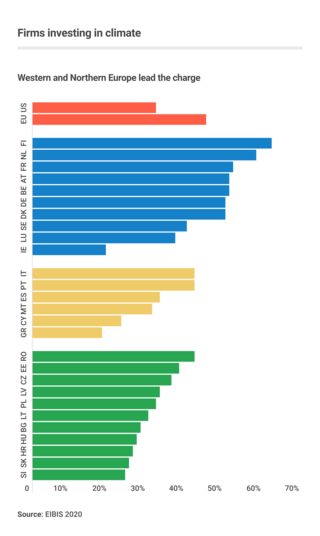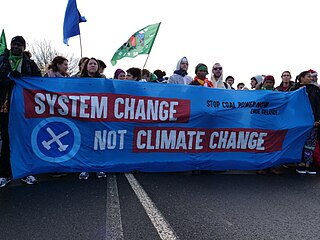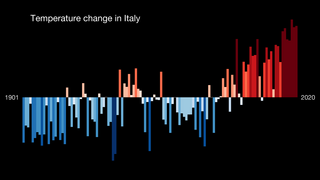
Friends of the Earth International (FoEI) is an international network of grassroots environmental organizations in 73 countries. About half of the member groups call themselves "Friends of the Earth" in their own languages; the others use other names. The organization was founded in 1969 in San Francisco by David Brower, Donald Aitken and Gary Soucie after Brower's split with the Sierra Club because of the latter's positive approach to nuclear energy. The founding donation of $500,000 was provided by Robert Orville Anderson, the owner of Atlantic Richfield oil company. It became an international network of organizations in 1971 with a meeting of representatives from four countries: U.S., Sweden, the UK and France.

A fossil fuel is a hydrocarbon-containing material such as coal, oil, and natural gas, formed naturally in the Earth's crust from the remains of dead plants and animals that is extracted and burned as a fuel. Fossil fuels may be burned to provide heat for use directly, to power engines, or to generate electricity. Some fossil fuels are refined into derivatives such as kerosene, gasoline and propane before burning. The origin of fossil fuels is the anaerobic decomposition of buried dead organisms, containing organic molecules created by photosynthesis. The conversion from these materials to high-carbon fossil fuels typically require a geological process of millions of years.

Business action on climate change includes a range of activities relating to climate change, and to influencing political decisions on climate change-related regulation, such as the Kyoto Protocol. Major multinationals have played and to some extent continue to play a significant role in the politics of climate change, especially in the United States, through lobbying of government and funding of climate change deniers. Business also plays a key role in the mitigation of climate change, through decisions to invest in researching and implementing new energy technologies and energy efficiency measures.

Shell Nigeria is the common name for Shell plc's Nigerian operations carried out through four subsidiaries—primarily Shell Petroleum Development Company of Nigeria Limited (SPDC). Royal Dutch Shell's joint ventures account for more than 21% of Nigeria's total petroleum production.

Fossil fuel phase-out is the gradual reduction of the use and production of fossil fuels to zero, to reduce deaths and illness from air pollution, limit climate change, and strengthen energy independence. It is part of the ongoing renewable energy transition, but is being hindered by fossil fuel subsidies.

Shell plc is a British multinational oil and gas company headquartered in London. Shell is a public limited company with a primary listing on the London Stock Exchange (LSE) and secondary listings on Euronext Amsterdam and the New York Stock Exchange. A core component of Big Oil, Shell is the second largest investor-owned oil and gas company in the world by revenue, and among the world's largest companies out of any industry. Measured by both its own emissions, and the emissions of all the fossil fuels it sells, Shell was the ninth-largest corporate producer of greenhouse gas emissions in the period 1988–2015.
Greenpeace USA is the United States affiliate of Greenpeace International, an environmental nonprofit organization that spawned a social movement inspired by direct actions on the high seas to stop whaling and nuclear testing. Headquartered in Washington D.C., Greenpeace U.S.A. operates with an annual budget of approximately $40 million, employing over 500 people in 2020. The organization relies on donations from members, refuses corporate contributions and refrains from endorsing political candidates, though in 2020 Greenpeace USA issued climate scorecards for presidential candidates and ranked them from best to worst on climate

Climate change is impacting the environment and human population of the United Kingdom (UK). The country's climate is becoming warmer, with drier summers and wetter winters. The frequency and intensity of storms, floods, droughts and heatwaves is increasing, and sea level rise is impacting coastal areas. The UK is also a contributor to climate change, having emitted more greenhouse gas per person than the world average. Climate change is having economic impacts on the UK and presents risks to human health and ecosystems.

Coal phase-out is an environmental policy intended to stop burning coal in coal-fired power plants and elsewhere, and is part of fossil fuel phase-out. Coal is the most carbon-intensive fossil fuel, therefore phasing it out is critical to limiting climate change as laid out in the Paris Climate Agreement. The International Energy Agency (IEA) estimates that coal is responsible for over 30% of the global average temperature increase above pre-industrial levels. Some countries in the Powering Past Coal Alliance have already stopped.

The climate movement is a global social movement focused on pressuring governments and industry to take action addressing the causes and impacts of climate change. Environmental non-profit organizations have engaged in significant climate activism since the late 1980s and early 1990s, as they sought to influence the United Nations Framework Convention on Climate Change (UNFCCC). Climate activism has become increasingly prominent over time, gaining significant momentum during the 2009 Copenhagen Summit and particularly following the signing of the Paris Agreement in 2016.

Droughts and heatwaves are the main hazards due to the climate of Turkey getting hotter. The temperature has risen by more than 1.5 °C (2.7 °F), and there is more extreme weather.

Vehicles that are powered by fossil fuels, such as gasoline (petrol), diesel, kerosene, and fuel oil are set to be phased out by a number of countries. It is one of the three most important parts of the general fossil fuel phase-out process, the others being the phase-out of fossil fuel power plants for electricity generation and decarbonisation of industry.

Juliana, et al. v. United States of America, et al. is a climate-related lawsuit filed in 2015 by 21 youth plaintiffs against the United States and several executive branch officials. Filing their case in the United States District Court for the District of Oregon, the plaintiffs, represented by the non-profit organization Our Children's Trust, include Xiuhtezcatl Martinez, the members of Martinez's organization Earth Guardians, and climatologist James Hansen as a "guardian for future generations". Some fossil fuel and industry groups initially intervened as defendants but later requested to be dropped following the 2016 presidential election, stating that the case would be well defended under the new administration.

Climate change litigation, also known as climate litigation, is an emerging body of environmental law using legal practice to set case law precedent to further climate change mitigation efforts from public institutions, such as governments and companies. In the face of slow climate change politics delaying climate change mitigation, activists and lawyers have increased efforts to use national and international judiciary systems to advance the effort. Climate litigation typically engages in one of five types of legal claims: Constitutional law, administrative law, private law (challenging corporations or other organizations for negligence, nuisance, etc., fraud or consumer protection, or human rights.
Our Children's Trust is an American nonprofit public interest law firm based in Oregon that has filed several lawsuits on behalf of youth plaintiffs against state and federal governments, arguing that they are infringing on the youths' rights to a safe climate system.

In Italy, widespread impacts of climate change are currently being felt. With an increase in extreme events such as heatwaves, droughts and more frequent flooding, Italy faces many challenges adapting to climate change.

State of the Netherlands v. Urgenda Foundation was a court case heard by the Supreme Court of the Netherlands in 2019 related to government efforts to curtail carbon dioxide emissions. The case was brought against the Dutch government in 2013, arguing the government, by not meeting a minimum carbon dioxide emission-reduction goal established by scientists to avert harmful climate change, was endangering the human rights of Dutch citizens as set by national and European Union laws.
This is an environmental history of the 2020s. Environmental history refers to events and trends related to the natural environment and human interactions with it. Examples of human-induced events include biodiversity loss, climate change and holocene extinction.
BP P.L.C. v. Mayor and City Council of Baltimore, 593 U.S. ___ (2021), was a case in the United States Supreme Court dealing with matters of jurisdiction of various climate change lawsuits in the United States judicial system.

Milieudefensie v Royal Dutch Shell (2021) is a human rights law and tort law case heard by the district court of The Hague in the Netherlands in 2021 related to efforts by several NGO's to curtail carbon dioxide emissions by multinational corporations. It was brought by the Dutch branch of Friends of the Earth and a group of other NGO's against the oil corporation, Shell plc. In May 2021, the court ordered Shell to reduce its global carbon emissions from its 2019 levels by 45% by 2030, relating not only to the emissions from its operations, but also those from the products it sells. It is considered to be the first major climate change litigation ruling against a corporation.















